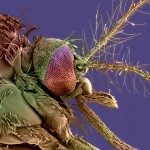Link to Pubmed [PMID] – 10072159
Am. J. Trop. Med. Hyg. 1999 Feb;60(2):319-21
We were able to infect Culex quinquefasciatus by the parenteral route with dengue virus type 2. The percentage of mosquitoes infected was dose dependent and we obtained a rate of 45.6% infected Cx. quinquefasciatus when a 10(5.9) MID50 (mosquito infectious dose for 50% of the individuals as measured in Aedes aegypti) of dengue virus type 2 per mosquito was used. Infection was detected by an immunofluorescent assay performed on mosquito head squashes 14 days after infection. The replication of dengue virus in Cx. quinquefasciatus was either at a very low level of magnitude or generated a large number of noninfectious particles since the triturated bodies of infected Cx. quinquefasciatus did not infect Ae. aegypti mosquitoes when inoculated parenterally. We were unable to infect Cx. quinquefasciatus females orally with an artificial meal that infected 100% of Ae. aegypti females. These findings lead us to agree with the consensus that Cx. quinquefasciatus should not be considered a biological vector of dengue viruses.

